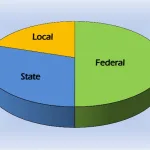In a dynamic economic landscape marked by fluctuations and uncertainties, Nigeria’s three tiers of government have successfully navigated the fiscal waters to share a total of N1.1 trillion in revenue allocation for the month of August.
This remarkable feat was announced by Bawa Mokwa, the Director of Press and Public Relations at the Office of the Accountant-General of the Federation, following the Federation Account Allocation Committee (FAAC) meeting held in Abuja on Friday.
Join our WhatsApp ChannelMokwa, in a statement, elaborated on the breakdown of the funds, which included various revenue streams: statutory revenue of N357.398 billion, distributable Value Added Tax (VAT) revenue of N321.941 billion, Electronic Money Transfer Levy (EMTL) revenue of N14.102 billion, Exchange Difference revenue of N229.568 billion, and augmentation funds of N177.092 billion. These components together formed the substantial N1.1 trillion pot.
He emphasized that the economic terrain was not without its challenges, stating, “A total revenue of N1,483.902 billion was available in the month of August 2023. The total deductions for the cost of collection amounted to N58.755 billion, with total transfers and refunds standing at N254.046 billion, and savings set aside at N71.000 billion.”
READ ALSO: Dollar Surges To N810 In Official Market, Parallel Traders Maintain Rates Above N1000
Notably, the gross statutory revenue of N891.934 billion for August marked a decrease from the N1,150.424 billion received in July, a difference of N258.490 billion. However, the gross revenue available from the Value Added Tax (VAT) increased to N345.727 billion, up by N46.938 billion from the previous month.
The distribution of these funds showcased a balanced approach to fiscal responsibility. From the N1.1 trillion total distributable revenue, the Federal Government received N431.245 billion, the State Governments received N361.188 billion, and the Local Government Councils received N266.538 billion.
Furthermore, an additional N26.473 billion (13% of mineral revenue) and N14.657 billion (13% of savings from NNPCL) were allocated to the relevant states as derivation revenue.
When breaking down the N357.398 billion distributable statutory revenue, the Federal Government received N173.102 billion, the State Governments received N87.800 billion, and the Local Government Councils received N67.690 billion. Similarly, N14.446 billion (13% of mineral revenue) and N14.361 billion (13% of savings from NNPCL) were shared with the relevant states as derivation revenue.
In the case of the N321.941 billion distributable Value Added Tax (VAT) revenue, the Federal Government received N48.291 billion, the State Governments received N160.971 billion, and the Local Government Councils received N112.679 billion.
The N14.102 billion Electronic Money Transfer Levy (EMTL) was distributed among the tiers of government, with the Federal Government receiving N2.115 billion, the State Governments N7.051 billion, and the Local Government Councils N4.936 billion.
Exchange Difference revenue of N229.568 billion was allocated with the Federal Government receiving N114.445 billion, the State Governments N58.048 billion, and the Local Government Councils N44.752 billion.
Additionally, N12.027 billion (13% of mineral revenue) and N0.296 billion (13% of savings from NNPCL) were designated as derivation revenue for the respective states. As an indicator of financial stability, the balance in the Excess Crude Account (ECA) stood at $473,754.57.
Emmanuel Ochayi is a journalist. He is a graduate of the University of Lagos, School of first choice and the nations pride. Emmanuel is keen on exploring writing angles in different areas, including Business, climate change, politics, Education, and others.



















Follow Us